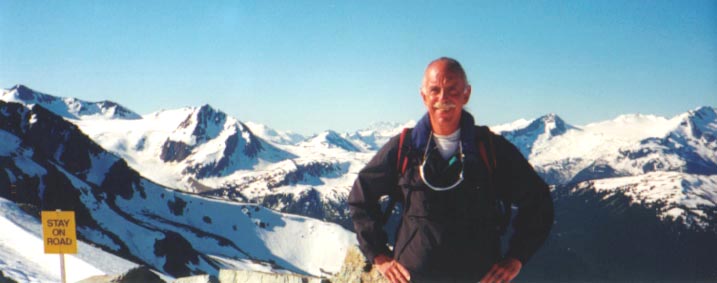 E-mail: santelli@fdu.edu This page captures the non-class-specific remainders of a page previously hosted by FDU before I retired. Now I offer it for the links I collected that were interesting and relevant for undergrad and grad students, but mainly for me! See it as a blog-like invitation for comments and potential additions via my e-mail. So you know who you are sharing stuff with here are some pics:  
Demonstrations and explanations of visual illusions: Michael Bach's marvelous Illusions site and Illusionworks Hall of Illusions. Sleep and Consciousness: The place to go to study sleep is Stanford University's Sleep Disorders Clinic's Web page, -------------------------------------------------------------------- The Experimental Psychology Section (for the course with that name, but hopefully of interest to all) Click here for the first part of a very good and extensive historical review. Click here for the second part of the historical discussion. Click here for the third part of the historical discussion.Click here for a brief overview of RT and other good links. BTW, while you're at the above site, surf around the links to the apparatus museums! Ready to write-up research? Here's a Hypertext Guide to the APA Style report. -------------------------------------------------------------------------------------------------------------------------------------------------------------------------Here are the links to the resource collection (in no particular order); some require download so that appropriate app may be used to open them: David Chalmers' Absent, Dancing and Fading Qualia Ned Block's Access and Phenomenal Consciousness Scott Acton's Position on Categories (naming) vs Dimensions in Diagnostic Classification Jaak
Panksepp's Systems of Affective Consciousness Classic Fordham U research describing the priesthood as an "ambulatory sanitarium" Barbara Montero on the Neuron Doctrine Peter Singer on Animal Liberation Dan Dennett's Autophenomenology vs Heterophenomenaology Darryl Bem's Exotic Becomes Erotic (EBE) re Homosexuality Kolb & Braun's Blindsight in Normals Blindsighted Person Negotiates Obstacles (WMV movie) Breland & Breland's The Misbehavior of Organisms Widiger on Categories vs Dimensions Cells
that Read Minds (mirror neurons) Cells that Read Minds NYT article Scott Acton on Classification of Psychopathology Max Velmans on the Co-evolution of Matter and Consciousness Conceiving the Impossible and the Mind-Body Problem Conceptions of Psychopathology Consciousness and its Place in Nature Critique of Libet's Nonconscious Volition Zajonc on the Unique Character of Emotions Ekman and Facial Expression of Emotions Electrical Properties of the Neuron Membrane Eliza the Computer Therapist Emulation Boring's
The Psychology of Controversy Cosmides and Tooby's Evolutionary Psychology Primer Chalmers' Facing Up to the Problem of Consciousness Terror Management Theory "Fatal Attraction" of Leadership Styles Jackson's What Mary Didn't Know Goodale's "Sight Unseen" (blindsight) Noe: Is Perception a "Grand Illusion?" Harrison's I Always Do What Teddy Says Ion Concentrations and the Equilibrium Potential Is Conscious Willing an Illusion? Bisson's They're Made Out of Meat They're
Made Out of Meat, the movie Chalmers' Moving Forward on the Problem of Consciousness Nagel's What Is It Like to Be a Bat Nagel's Brain Bisection and Consciousness Block's Access vs Phenomenal Consciousness Classical Conditioning as seen on The Office Perceptual Blindness Demonstration Philosophy
of The Matrix (trilogy) Pockett: Does Consciousness Cause Behavior Ramachandran on the neuroscience of art. Ramachandran and Hubbard on Synaesthesia Recovery From Early Blindness (von Senden) Scientific Peer Review Circa 1945 Searle: Why I Am Not a Property Dualist The Social Construct of Mental Disorder Split Brain Behavioral Experiments Stratton's 1896 Experiments With Inverting Goggles Synaptic Potentials and Integration The Myth of the Reliability of the DSM Wegner: Precis of The Illusion of Conscious Will Dretske: What Good is Consciousness? What the Frog's Eye Tells the Frog's Brain Widiger & Trull: Categorical vs Dimensional Approaches to Disorders Boring: Zeitgeist and Discovery Schachter's The Seven Sins of Memory
 (Meanwhile, as this is developed, you can play with Sniffy the virtual rat by clicking on her) Skiers: Progressions Ski This Way Snowsports Make You Smarter Skiing in Circles
Video
Transitions
Slopeside
Schadenfreude It
Isn't Falling; It's Learning Not to Fall |
John C. Santelli, PhDProfessor Emeritus, School of PsychologySo long as authority inspires awe, confusion and absurdity enhance conservative tendencies in society. Firstly, because clear and logical thinking leads to a cumulation of knowledge (of which the progress of the natural sciences provides the best example) and the advance of knowledge sooner or later undermines the traditional order. Confused thinking, on the other hand, leads nowhere in particular and can be indulged indefinitely without producing any impact upon the world.--Stanislav Andreski, Social Sciences as Sorcery [As opposed to erroneous, epidemiological, social beliefs]. . .the selective forces that scrutinize scientific ideas are not arbitrary and capricious. They are exacting well-honed rules that do not favor pointless self-serving behavior. They favour all the virtues laid out in textbooks of standard methodology: testability, evidential support, precision, quantifiability, consistency, intersubjectivity, repeatability, universality, progressiveness, independence of cultural milieu and so on. -- Richard Dawkins We should try to love the questions themselves, like locked rooms and like books that are written in a very foreign tongue. --Rainer Maria Rilke The more the universe seems comprehensible, the more it also seems pointless. --Steven Weinberg Those who reject the scientific conception of man must, to be logical, oppose the methods of science as well. --B. F. Skinner It is a capital mistake to theorize before one has data. Insensibly one begins to twist facts to suit theories, instead of theories to suit facts. --Sherlock Holmes Thus do pretenders to science vainly and preposterously seek for remedies, ignorant of the true nature of things. --William Gilbert, De Magnete Learn from science that you must doubt the experts. I'm going to describe to you how Nature is--and if you don't like it, that's going to get in the way of your understanding it. It's a problem that physicists have learned to deal with. . .whether they like a theory. . .is not the essential question. Rather, it is whether or not the theory gives predictions that agree with experiment. . . . The theory of quantum electrodynamics describes Nature as absurd from the point of view of common sense. And it agrees fully with experiment. So I hope you can can accept Nature as She is--absurd. --Richard Feynman Consciousness is the biggest mystery. It may be the largest
outstanding obstacle in our quest for a scientific understanding
of the universe. Experience is information from the inside; physics is
information from the outside. What a wonderful thing, to be conscious! I wonder what the
people in New Jersey do? --Woody Allen [We]will in the end have to admit that some things can only be grasped up to a certain point, and that Nature always retains behind her something problematic which it is impossible to fathom with our inadequate human faculties. --Goethe Yes, many things there are, which seem to be Perplexing, though quite falsely so, because They have good reasons which we cannot see.... --Dante, Purgatorio It is truly extravagant to define God, angels, and minds, and to know precisely why God defined the world, when we do not know why we move our arms at will. Doubt is not a very agreeable state, but certainty is a ridiculous one. --Voltaire A tolerably clever man began his book with these words "Man, like all animals, is composed of two distinct substances, the soul and the body. If anyone denies this proposition it is not for him I write." I nearly shut the book. Oh! ridiculous writer, if I once admit these two distinct substances, you have nothing more to teach me. --Diderot Everything in the world has changed except our way of thinking. --Albert Einstein I don't think. My thoughts think for me. -- de Lamartine "Logic! Good Gracious! What Rubbish!" she
exclaimed. "How can I tell what I think till I see what I
say?" -- E. M. Forster ...while some areas of human life show great diversity, in others, human behavior stays fairly constant across the whole range of human cultures, and some aspects of our behavior are also shared with our closest nonhuman relatives. . . .those seeking to reshape society must understand the tendencies inherent in human beings, and modify their abstract ideals in order to suit them. . . .for the first time since life emerged from the primeval soup, there are beings who understand how they have come to be what they are. To those who fear adding to the power of government and the scientific establishment, this seems more of a danger than a source of freedom. In a more distant future that we can still barely glimpse, it may turn out to be the prerequisite for a new kind of freedom. --Peter Singer, A Darwinian Left We're human beings with the blood of a million savage years on
our hands. But we can stop it. We can admit that
we're killers, but we won't kill today. --Capt. James T. Kirk Man will become better when you show him what he is like. --Anton Chekhov The beast does but know, but the man knows that he knows. --John Donne If we had to offer the briefest explanation of all the evil that men have wreaked upon themselves and upon their world since the beginnings of time right up until tomorrow, it would not be in terms of man's animal heredity, his instincts and evolution: it would be simply in the toll that his pretense of sanity takes, as he tries to deny his true condition. --Ernest Becker, The Denial of Death Several years ago a thought struck me that at first seemed so aberrant as to embarass me. That was that mind, rather than being. . .a late product of evolution. . .had been there from the start. A physicist is an atom's way of knowing about atoms. --George Wald When you can measure what you are speaking about and express it in numbers, you know something about it; but when you cannot measure it, when you cannot express it in numbers, your knowledge is of a meager and unsatisfactory kind. --Lord Kelvin . . .if we always insisted on precise definitions we all would be speechless almost all the time. Definitions and precise theoretical constructs are the final product, not the starting point of inquiry. --Lawrence Weiskrantz --Sigmund Freud We cannot, indeed, directly will to be different from what we
are; but neither did those who are supposed to have formed our
characters directly will that we should be what we are.
Their will had no direct power except over their own
actions. . . We are exactly as capable of making our own
character, if we will, as others are of making it for
us. --John Stewart Mill
*********************** |
||

